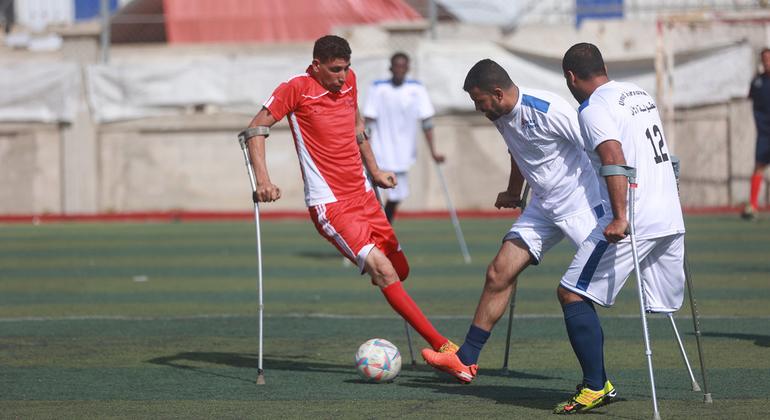Today – amid a fragile ceasefire and the devastation of her homeland – she stands on the football pitch not only as a player, but as a symbol of resilience and hope.
To Farah, football is more than just a game – it is a fresh beginning, a way to reclaim her identity, and a bridge to cherished pre-war memories.
Never give up
“I came here to practice sport so I can be as I was in the past, and to reclaim memories. My message is: continue the journey, don’t give up. Do not let anything stand in your way. Despite your injury, you must insist on being like everyone else,” she told UN News.
Farah Youssef, a member of the Palestine Amputee Football National Team, who is participating in the championship.
Farah is one of dozens of players who took part in the Hope Football Championship for Amputees in Gaza, demonstrating that disability does not mean inability, and that passion for sport can become a pathway to healing and empowerment.
The tournament was organised by the Palestine Amputee Football Association and hosted at the Ittihad Shabab Deir al-Balah Club Stadium.
Limbs lost, but spirits high
It brought together male and female players who had lost limbs in the conflict yet continue to play with remarkable spirit and determination.
Our correspondent was at the stadium to capture the competitive atmosphere and inspiring scenes during the four-day championship, which concluded last week.
The initiative forms part of wider efforts to support those injured in conflict and to encourage their inclusion in sport – despite the rubble and hardship all around them.
As part of its mission, the association aims to integrate thousands more who were injured in recent hostilities.
A missed chance for the World Cup
Captain Ali Abu Armanah, coach of the Palestinian National Amputee Football Team, reflected on the team’s lost opportunity to qualify for the 2026 Amputee Football World Cup in Costa Rica.
“We launched this championship to revive hope after two years of war against our children and families in the Gaza Strip. At this very time, we were supposed to be in Jakarta, Indonesia, representing Palestine in the West Asia qualifiers, but the ongoing conflict and closure of the border crossing prevented our participation.”
The Palestine national team only missed out on qualification for the FIFA World Cup next year by a single point, after drawing in their final group stage game in June, as war still raged.
Life on one leg
Mohammad Abu Jufail, a former footballer, lost his leg in the 2014 war in Gaza. The physical and psychological challenges were immense, but he chose not to give up.
“I used to play football before my injury. After my leg was amputated, I stopped playing for about five months. Then the club I played for told me there was a special team for amputees. The beginning was difficult; I had played with two legs, and now with one, using crutches.
“We trained continuously for two years, and we met an amputee athlete from abroad who guided us. After that, we resumed our lives,” he said.
Call for greater support
Player Abdullah Abu Mukhaimer highlighted the scale of need. “We are sending a message that we are still contributing through football in Gaza, and many new players are joining. There are nearly 60,000 amputees in Gaza after the war. We call on the relevant authorities to support amputee football because the numbers are extremely high.”

The Hope Championship for Amputee Football in the Gaza Strip 2025.
6,000 amputations in two years
According to local health organisations in Gaza, more than 6,000 cases of limb amputation were recorded over the past two years of conflict between Israeli forces and Hamas militants, requiring urgent and long-term rehabilitation.
Children represent an estimated 25 per cent of all amputee cases, while women account for nearly 13 per cent.
Assistive devices continue to be in short supply which is deepening the suffering of those living with war-related disabilities.



